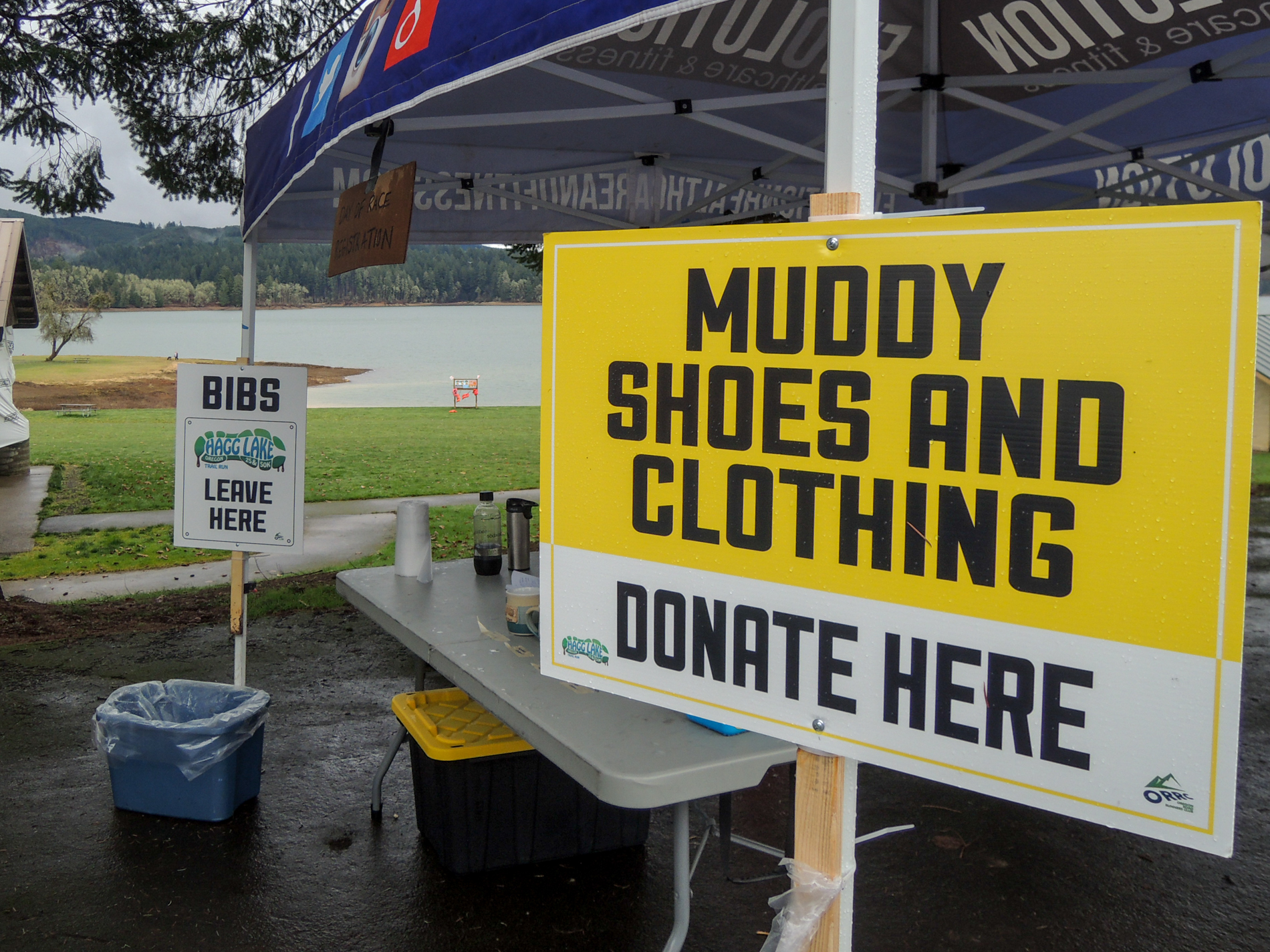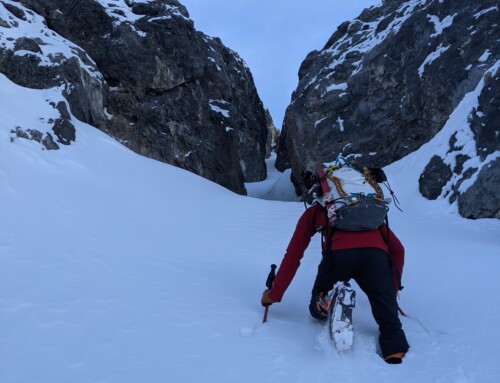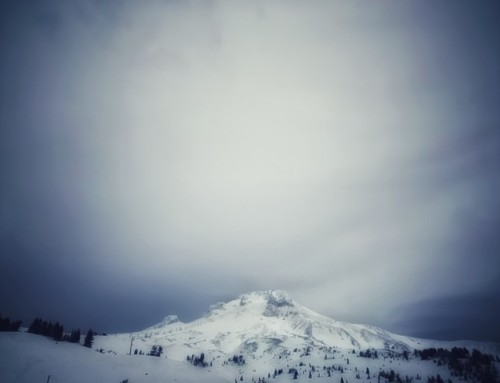18 Years of Slop
Over the weekend of February 17th and 18th, the 18th annual Hagg Mud Runs hosted by the Oregon Road Runners Club took place at Henry Hagg Lake outside of Gaston, Oregon. This race is actually a trail race, circling the lake twice on Saturday for the 50k and once on Sunday for the 25k. This year really lived up to the name, as it was a slip and slide like no other. Entrants could choose to compete in the 50k, the 25k, or the DOUBLE!
The Hagg Mud Runs were started way back in 2001, when there were very few options for trail runners. Part of the original Oregon Trail Series, which included the McDonald Forest 50k, Bendistillery 50k, Siskiyou Out & Back 50k, Pacific Crest Trail 50k/50M, and the McKenzie River 50k, Hagg Mud was the Oregon Road Runner’s Club contribution to the growing trail running community. Since its very first year, the Hagg Mud Runs have been a non-profit race benefiting the Oregon Road Runners Club (ORRC), which is the second oldest and largest running club in Oregon. ORRC supports runners and walkers in all stages of life on whatever surface they choose to enjoy through a variety of running programs, community grants and local events. Hagg Mud is the only trail race for ORRC, and it is one of two ultras the club puts on. None of the race directors are compensated for their time.
Hagg Lake Mud Run’s Commitment to Trash
2018 also marked the second year that a dedicated team of three co-race directors (Karen Peterson, Teri Smith, and Lauri Westenberg) handled all the logistics that go into putting on an event like this. And this year, they made a dedicated effort to minimize their impacts and eliminate the amount of waste generated by the event. They succeeded, generating only four pounds of trash which was all consolidated into one small garbage bag. Everything else was composted, recycled, or donated. We thought this was extremely impressive and wanted to find out exactly why they wanted to do this, and how they were able to accomplish it. Here are a couple of major points, and some details on how and why the RDs took this approach to take the trash out of ultra running.
- Composting food scraps and dishware (including napkins and soup spoons).
- Recycling all recyclables (including both curbside and non-curbside items).
- Providing clearly marked bins for recycling and composting (at the start/finish and aid stations).
- Recruiting and training volunteers to help manage and monitor recycling.
- Donating left-behind muddy shoes and clothing (runners were also encouraged to bring any old running shoes from home for donation).
- Recycling runners’ bibs and energy gels/endurance wrappers.
Question: Why was it important to the race directors (RDs) to minimize waste this year at the Hagg Mud Runs?
Answer: We know running is good for us, but it should also be good for the planet. As race directors, we’re committed to conserving resources and sending as little as possible to the landfill, while providing an exceptional experience for all – runners, volunteers, and spectators.
The idea really started at last year’s race when Erin Fitzgerald (who runs the outdoorsy blog, Adventures in Thumbholes) pulled recyclables out of the garbage and then made recycling signs on the spot to help us reduce waste while she was volunteering. That was the spark. Then this past October, we attended the US Trail Running Conference and listened to a presentation by Keith Peters of the Council for Responsible Sport. His talk went over the many ways we can reduce and limit our environmental impact, and why this is an important thing to do. After talking with him for some time, we knew that this was a step that would be important to take. We felt like we had the bandwidth to take it on, and we knew that we would have an excellent partner in Erin if we could talk her into heading up the initiative (we did). And then Erin brought on Elizabeth (Liz) Erickson to help her. Liz has experience in this area and is dedicated to waste reduction.
Question: Have you noticed significant amounts of waste here in years past, or at other events you have been a part of?
Answer: It only takes packing out a large garbage bag of Dixie cups from an aid station once to realize how much waste is generated if you don’t properly manage it. We all know what the garbage cans of cups look like during a road marathon! Trail races are definitely moving toward cupless racing to eliminate unnecessary waste. The thought of managing the waste cycle had not occurred to us until Erin pointed out that we were essentially doing nothing in this area last year. Once we started thinking about all the places we were generating waste, we quickly realized how much we were making and knew we had to reduce our impact and send as little as possible to the landfill.
Question: Ultra runs utilize a lot of single serve packages of food, for things like GU energy gels. Are these types of packages recyclable?
Answer: Surprisingly they are through a company called TerraCycle. Here in Portland, the Fleet Feet on NW Raleigh Street is a drop off location for used gel packets and endurance wrappers (any brand). We used a plastic container to collect them at aid stations and the start/finish. At home, you could do the same over the course of a couple months and then drop them off at Fleet Feet when you need to stock up on more gels or get a new pair of shoes (or send directly to TerraCycle at no cost if Fleet Feet is not convenient for you – the’ll even provide a shipping label).
Question: What steps were taken at the start/finish line to make sure handling all the waste was done properly?
Answer: It all started with a clear vision and a commitment to send as little as possible to the landfill. We had clearly-marked bins set up for composting and recycling. We had our two Master Recyclers, Liz and Erin, monitoring them and making sure everything went into the correct bins. Training of kitchen volunteers was done ahead of time to ensure compliance. We also had a collection point for gel wrappers/endurance wrappers, as well as race-day shoes and clothing (for donation) and runners’ bibs (for recycling). They were constantly making sure everything was sorted properly so we didn’t have to do a massive sort at the end. Our goal is improve on our processes every year so we’re as efficient as possible and have minimal sorting after the fact.
Question: What about the two aid stations? How did you ensure effective waste management in off-site locations you could not directly oversee?
Answer: We had the same collection points as at the start/finish area. There was much less waste however, since all of the aid station food is served without utensils or plates. We had volunteer recycling captains who had been trained ahead of time to manage the collection and sorting at each aid station. Each day’s collections were brought back to the start/finish to make sure we were in full compliance.
Question: Were the runners themselves asked to do anything to help with the effort, and did they seem eager to comply?
Answer: We communicated ahead of time via email what we were doing to reduce waste and asked runners to be mindful of what they brought with them on race day (could it be recycled or composted?). The biggest ask was for runners to carry their own cup during the race. This eliminates so much trash with this one step. All of those tiny cups that get used for water and soda are now not part of the equation. Beyond that, they had to put their used gel wrappers in a tub, sort their garbage into compost or recycling…really not a lot! We also encouraged them to leave their bibs behind since we were sending them to Tyvek for recycling (for an added incentive, we pulled one bib number each race day for a free entry into next year’s race). I think their compliance seemed to be seamless; we didn’t hear a peep from anyone that they even noticed it, really, which is exactly how it should be! All feedback has been extremely positive.
Question: Can you tell me more about Erin and her blog, Adventures in Thumbholes, and how she helped you eliminate waste?
Answer: Erin is a Portland-based trail runner and certified Master Recycler through Metro. Her blog, Adventures in Thumbholes, encourages stewardship and positive change in our running and race communities. She often blogs about her “trashy runs” (and posts pictures of litter she’s picked up to Instagram), which has earned her the reputation of a dedicated litter-picker-upper. She is currently striving for a zero waste home.
Her passion for conservation and preserving our wild places was just what we needed to reduce waste at Hagg. She had the vision and challenged us to work toward zero waste. Erin set the bar high—and we’re so glad she did—we only generated four pounds of waste. She had a great partner in Elizabeth Erickson (also a Master Recycler) who helped throughout the planning process and race-day implementation. Liz added tremendous value – they were a great team. If you have questions for Erin or are interested in reducing waste at your race, you can reach her at erinfitz_99@yahoo.com.
Question: How “easy” do you feel like this was to accomplish?
Answer: Because of Erin and Liz’s efforts, this did feel like an easy achievement. They were amazing and took care of all of the details. They sourced compostable goods and figured out what could be recycled, and where. Managing race day operations and sorting through everything that was being put into the bins was left to Erin and Liz. They even developed a training program for the volunteers we recruited to manage the recycling portion at the aid stations and start/finish. It would have proved far more challenging without their help. We highly recommend getting help with these initiatives. As the race director, you wouldn’t have enough bandwidth to manage the process yourself on race day.
Question: Was it worth it to you?
Answer: Absolutely! When we saw the tiny bag of trash that was the sum total of our waste, it became so clear that this was worth the time and effort. We heard from folks who were inspired to do better at home. We hope that they will be inspired to care for their favorite trails. It’s so easy to pick up garbage along the way. It’s only when these things are brought into our consciousness that we can do better. And we know we need to do better for our planet. We don’t expect that we’ll have more runners because of our efforts, but that’s not our motivation. It’s about being responsible. It’s an important message and we hope our efforts and initiatives will become the norm in the sport.
Question: Did you get any positive or negative feedback from runners or family members who attended the event?
Answer: We have only received positive feedback. We communicated that we were a cupless race very clearly (as well as about our other initiatives to reduce waste). So many trail races are already heading in that direction, so it really didn’t take anyone by surprise. All of our other race day operations stayed the same. We loved that we could serve food in compostable dishware (including soup spoons, napkins, and beer cups for runners who needed one). It was inspiring for some to realize that you can reduce your footprint with some pretty simple steps.
Question: What advice would you give to other RDs who might be thinking of taking a similar approach, or perhaps who have not thought of making this positive change?
Answer: Go for it. Our planet is choking in waste. If we can reduce that even a small amount, why wouldn’t we? Some of your costs may go up slightly. You may have to spend money on materials that allow you to recycle everything. But you may also find that some of your costs go down as you find ways to reuse supplies. Get smarter about how you problem solve, and learn to think creatively with the unique challenges of ultra waste. And get some help! Master Recyclers are a wonderful resource for this type of project. The Council for Responsible Sport is another wealth of information. You might not think about your race in this way, but some people think about reducing waste constantly. They can help steer you in the right direction.
As a race sponsor, Evolution thanks you for making the effort to minimize waste at this event. We know it takes a lot of work to put one of these ultra runs on. You three ladies really do a great job taking care of all the runners and volunteers. We look forward to supporting you for years to come. If anyone reading this would like to take part, as a runner or a volunteer, just make sure to follow their Facebook page for all the details!






